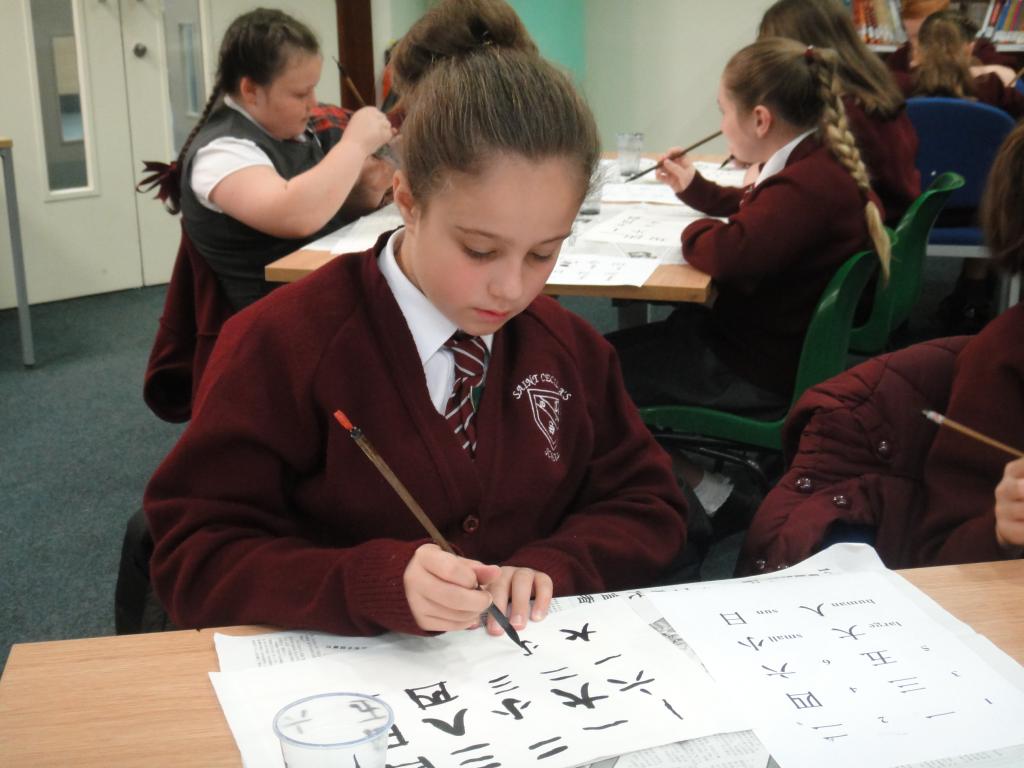Confucius Institutes to diversify goals

Pupils practice Chinese calligraphy at the Confucius Institute of Liverpool University. They were invited to celebrate Confucius Institute Day, marking the 10th anniversary of the organization.
Scholars hailed the diversified development of the Confucius Institute at the 10th Confucius Institutes Conference, which was held in Shanghai on Dec. 6.
This year marks the start of a new 10-year development phase for Confucius Institutes. Over the last 10 years, the organization has spread across the world and made substantial progress.
The first Confucius Institute was established in 2004 based on the experiences of the UK, France, Germany and Spain, which had all set up similar vehicles for promoting their respective languages. The aim was to found a non-profit educational institution to teach Chinese language and culture overseas.
Through the concerted efforts of multiple parties, 2015 has seen the completion of the tasks for the first three years of the Development Plan of Confucius Institutes (2012-2020). Today, there are 500 Confucius Institutes in universities and 1,000 Confucius Classrooms in primary and middle schools across 134 countries and regions around the world, serving nearly 2 million students.
“The Confucius Institutes and classrooms have played an active role in helping people around the world to learn the Chinese language and understand the nation’s culture. In addition, they have also made important contributions to China's people-to-people exchanges with the world as well as the development of a diverse and colorful world civilization,” Chinese President Xi Jinping said while attending the Opening Ceremony of the Annual Conference of UK Confucius Institutes and Classrooms during his state visit to the UK in October.
At the Conference, Roseann Runte, president of Carleton University in Canada said, “the Confucius Institute is helping people all over the world learn Chinese language and culture.”
Runte said that the institute is not only part of the academic and teaching framework of the host university and integrated into the teams of teachers and scholars, but is also incorporated into the systems of teaching quality evaluation and regular assessment.
Carleton’s Confucius Institute emphasizes new instructional technologies that employ virtual communication to get more students involved in cooperative learning. It also goes beyond the campus to provide services for society, collaborating with businesses to boost trade and with academia to promote exchanges, Runte said.
Looking ahead to the development prospects of Confucius Institutes over the next five years, Lee Yun Hwa, provost of Andong National University in South Korea, noted that some Confucius Institutes emphasize economic and trade services while others focus on traditional culture or comprehensive development.
Each country or region varies in historical tradition and cultural background, so Confucius Institutes should take local historical and cultural features into consideration in future development to realize diversified development, Lee added.
With Confucius Institutes playing an increasingly vital role, instruction has been expanded to include all levels of local communities. They are not only responsible for teaching Chinese language, but also cooperate with foreign partner institutions to provide degrees at the undergraduate level and higher as well as bases for research.
Meanwhile, they also harnesses institutional strength to conduct research on international issues and strengthen contact and exchange with local experts, thus providing powerful backing for China’s diplomacy, economic exchange, and cultural and educational development.
The conference gathered more than 2,300 people, including representatives from universities and Confucius Institutes around the world, diplomats, and businessmen. Chinese Vice-Premier Liu Yandong, who is also president of the Confucius Institute Headquarters council, addressed the event and also announced the establishment of the alumni association for Confucius Institutes.
Li Yu and Zha Jianguo are reporters at the Chinese Social Sciences Today.
